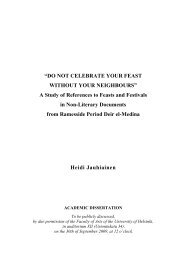BIA
bia51
bia51
Create successful ePaper yourself
Turn your PDF publications into a flip-book with our unique Google optimized e-Paper software.
MAI 2015<br />
l’accroissement des documents », déclare al-<br />
Nabawî.<br />
Le bâtiment peut abriter 60 millions de<br />
documents pour une capacité de 30 kilomètres<br />
linéaires. Il est prévu le transfert de documents<br />
de Dâr al-Kutub vers le nouveau site, en plus<br />
de 8 600 documents provenant de divers<br />
organes administratifs.<br />
« En vue de mettre au point un système<br />
adéquat pour la gestion des archives, nous<br />
avons fait une étude sur les Archives<br />
nationales de France, de Grande-Bretagne,<br />
d’Espagne, de Hollande, d’Italie et des États-<br />
Unis. Et enfin nous avons construit notre<br />
bâtiment à nous en apportant notre touche<br />
personnelle », renchérit an-Nabawî. Partant<br />
d’une idée selon laquelle une nation sans<br />
histoire est une nation sans repères, les<br />
archives, facteur mesurant le progrès de l’État,<br />
sont les reflets des aspects de la vie politique,<br />
économique, mais aussi culturelle et identitaire.<br />
(Nasma Réda, « Archives nationales version<br />
numérique », Al-Ahram Hebdo du 20 mai 2015.<br />
Voir également Dînâ ‘Abd al-‘Alîm, « 7 778<br />
ouvrages et un exemplaire de la Description de<br />
l’Égypte offerts par l’émir de Sharjah à l’Institut<br />
d’Égypte », al-Yawm al-Sâbi‘, 10 mai).<br />
- -<br />
Jeudi 21 mai 2015<br />
As the value of antiquities continues to<br />
skyrocket, organised criminals, armed insurgents<br />
and terrorist networks have turned to cultural<br />
racketeering to fund crime and conflict around<br />
the world.<br />
Recent videos on social media showing<br />
Islamic State (IS) militants destroying ancient<br />
artefacts in Iraq’s museums and blowing up<br />
3,000-year-old temples, destroying priceless<br />
heritage, have sent shockwaves through the<br />
archaeological community and international<br />
organisations.<br />
In some of the videos, militants can be<br />
seen taking sledgehammers to the iconic<br />
winged bulls of Assyria and sawing apart floral<br />
reliefs in the palace of Ashurnasirpal II in<br />
Nimrud. Afterwards, the entire site was<br />
destroyed with explosives.<br />
In an attempt to stand up against such<br />
crimes and stop the destruction of ancient<br />
temples and artefacts in Iraq by the extremist<br />
IS group, as well as the looting and smuggling<br />
of antiquities in Iraq, Syria, Egypt and Libya, a<br />
two-day conference titled “Culture Under<br />
Threat: the Security, Economic and Cultural<br />
Impact of Antiquities Theft in the Middle East”<br />
was held in Egypt this week.<br />
It was organised by two US-based NGOs,<br />
the Antiquities Coalition and the Middle East<br />
Institute, in cooperation with Egypt’s ministries<br />
of foreign affairs and antiquities and under the<br />
joint patronage of UNESCO.<br />
Ten Arab countries attended the conference,<br />
including Iraq, Jordan, Libya, Sudan, Lebanon,<br />
Saudi Arabia, the United Arabs Emirates,<br />
Kuwait, Oman and Egypt. The aim of the<br />
conference was to step up international efforts<br />
to stop the illicit trafficking of cultural objects<br />
and antiquities as a means of financing<br />
terrorism.<br />
BOKOVA and al-Damâtî during the conference’s opening session<br />
at the MIA<br />
Ever since antiquity, cultural heritage has<br />
been a casualty of crime and conflict. As long<br />
as there have been tombs, there have been<br />
tomb raiders and illicit excavations. As long as<br />
there have been civilisations, there have been<br />
enemy armies bent on plundering them.<br />
“Egypt holds a special place in UNESCO’s<br />
history because it has defined the gold<br />
standard in international cooperation for<br />
safeguarding the common heritage of humanity<br />
— this is precisely the spirit we need to install<br />
today,” UNESCO Director-General Irina BOKOVA<br />
said at the conference.<br />
She pointed out that the 1960s salvage<br />
campaign for the Nubian temples in Upper<br />
<strong>BIA</strong> LI — Janvier/Juin 2015 130



